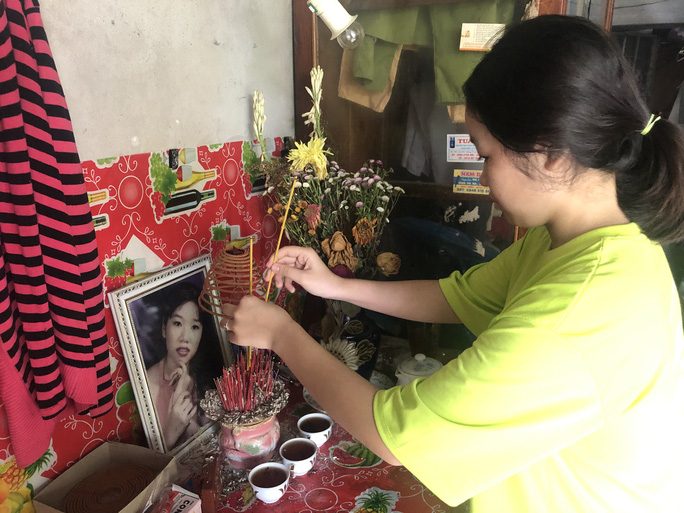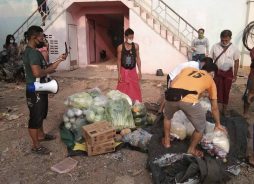
A TEENAGE DAUGHTER MOURNS THE DEATH OF HER MOTHER, A VIETNAMESE DOMESTIC WORKER WHO PERISHED IN SAUDI ARABIA IN NOVEMBER 2020. IMAGE COURTESY DUY NHÂN.
ANGIE NGOC TRAN - 29 NOV, 2021
The recent death of an underage woman, H Xuân Siu, an ethnic minority Jarai from DakLak, Vietnam, who was recruited to work as a domestic worker in Saudi Arabia, shocked the world. More details, exposed on Facebook by her sister-in-law and other news outlets reveal an exploitative transnational labour export system that sends young and old women from poor areas in Vietnam to work as domestic workers in the private homes of their visa sponsors in the Gulf states. As of 2020, nearly 7,000 women are employed as domestic workers for Saudi families. While COVID-19 exacerbates the vulnerability of all overseas migrant workers, it is worse for domestic workers because they are invisible and isolated in their sponsors’ houses, and are completely at the mercy of their sponsors. The Kafala (visa sponsorship) system dictates the employment conditions for foreign guest-workers in the Gulf states. In domestic work, the sponsor is the head of household and also the employer, whose authority goes unquestioned and unsupervised. Domestic workers are tied to the original sponsors who can deport them if they are not pleased with the workers’ service, or transfer them from one household to another without any consent from the workers (a rampant practice during COVID-19). Workers cannot venture outside because their passports are confiscated by their employers as soon as they set foot in the destination countries. From then on, many are treated as slaves, not knowing whether they will be paid or not, going hungry, and enduring physical and sexual abuses until they manage to return to Vietnam.
H Xuân Siu was only 16 when recruited by VINACO, a recruitment company in Vietnam which is a member of VAMAS, a Vietnamese Association of Manpower Supply sanctioned by the Ministry of the Interior since 2003. VINACO is alleged to have increased her age in order for her to work in Saudi Arabia. After two years of working there, she pleaded to return home but died of heart failure at 18. But she died having made allegations of physical abuse perpetrated by her sponsor, which were recorded in phone conversations with her friends. The family pleaded to bring her body home but VINACO refused unless the family accepted the incorrect age they put on her passport (which listed her birth year as 1996, rather than the correct year of 2003). This delay caused her final burial to take place in Saudi Arabia on November 4, 2021, devastating her family in Vietnam.
However, there are other tragic cases that have not been brought to the attention of the global community. A young woman (of Kinh descent) died abruptly and was buried in Saudi Arabia from COVID-19 while employed as a domestic worker for a family in Riyadh City. She left behind two young children and a frail father. She promised to return to her family for good in October 2020, and the family waited and waited until the bad news came in December. In conversation with the journalist who wrote this article, I found out that the sponsor had owed her back wages and only paid them to the family when the violation was exposed in Vietnamese article, which pressured the local government to intervene on behalf of this poor family.
Social media and independent news outlets have exposed these abuses and how these domestic workers were abandoned not only by the recruitment companies, but also by the Vietnamese embassy there. They found rampant physical abuses of Vietnamese domestic workers in Saudi Arabia. Speaking on behalf of a group of domestic workers in a deportation camp in Riyadh, a female domestic worker recorded a poignant SOS message addressed directly to the Vietnamese Prime Minister, the Vietnamese Embassy there and the internet community to bring them home because they have been stuck there (some for over a year) due to many abuses not of their own making. Other sources show photos of physically and sexually abused workers who took refuge in a Riyadh shelter after running away from their Saudi sponsors.
Why are these abuses hidden until it is too late for some women? We need to understand the self-sustaining and coherent transnational labour brokerage system that exploits and abuses domestic workers, in order to demand reforms and justice for these domestic workers.
In 2014, the Vietnamese and Saudi Arabian governments signed a five-year labour agreement to send women from Vietnam to work as domestic workers in Saudi Arabia. It included an automatic renewal clause, supposed to be activated in 2019. This agreement benefits ministries of both governments, the recruitment companies from both sides, and the sponsors’ households in the host country; the program rests on the backs of migrant workers, 100% are women of different ethnic groups from Vietnam who earn US$400 per month, working 7 days a week and over 12 hours per day. After a lot of searching, I could not find any announcement about the renewal or any update of the terms. But I found reports of the VAMAS decision on December 17, 2020, to form and appoint the leaders for the Department on the Middle East Domestic Help Market, with the general president of VINACO joint stock company as one of the leaders serving on this board. This suggests that this bilateral labour agreement has been renewed with all of the existing stipulations that imperil potential domestic workers.
Even under increasing global pressure, Saudi Arabia excluded domestic migrant workers from the so-called reform of the Kafala system which went into effect on March 14, 2021. Domestic workers and farmers continue to be the least protected, most vulnerable to abuse, and not covered by the labour law. Under this half-hearted Kafala system, domestic workers are still denied all protections, including the right to join trade unions or strike.
Reading exchanges on the public Facebook page on Saudi Arabia reveal all types of contract violations endured by domestic workers: not having enough food to eat, no break times in a 12-hour plus workday, not receiving personal hygiene items and medical supplies as contractually agreed, and not receiving wages in full. Their passports are confiscated, so they cannot even leave the house or use their passports to buy a commercial plane ticket home using their own savings. Many domestic workers have finished their 2-year contracts but are stranded in Saudi Arabia due to COVID-19 and want to go home to reunite with their families. Most cannot afford exorbitantly expensive chartered airfares (upwards of US$3000) to return to Vietnam. Most are completely at the mercy of the sponsors who make false promises to buy plane tickets for them. VINACO has representatives in Riyadh but they have turned a blind eye to workers’ pleas, as aptly described by a common Vietnamese saying: “Leaving babies stranded in the market-place.”
International labour and migration organizations, including the International Labour Organization (ILO), International Organisation for Migration (IOM), and Global Forum on Migration and Development (GFMD) need to pay attention to abuses suffered by domestic workers who are still stuck in Saudi Arabia. They need to scrutinise the genuine implementation of the VAMAS code of conduct and hold its recruitment company members, including VINACO, accountable to and compliant with their code of conduct. Evidence shows that VINACO has been doing exactly the opposite of the code of conduct to which they subscribe and they continue to lead the Department on the Middle East Domestic Help Market to ensure that this system functions for their benefit. Moreover, the promise made by the Deputy Minister for International Labor Affairs of Saudi Arabia as signatory of the 2014 labour agreement on fair and humane treatment of domestic workers needs to be fulfilled by the Saudi Ministry of Labor, especially when this agreement appears to have been renewed for five more years.
RELATED

In limbo: Migrant workers struggle with the Myanmar coup and COVID-19
As their travel documents expire Myanmar migrants risk becoming undocumented and excluded from legal protections by shortcomings in both Myanmar and Thai migration policies.
ROISAI WONGSUBAN 09 JUNE, 2021
Worse yet, there is no monitoring of the proper implementation of the terms of the contracts. While the revision of the Vietnamese Law 72 (2006), Law 69/2020/QH14 (starting January 1, 2022) forbids brokerage fees, this stipulation does not help Vietnamese domestic workers when the Kafala system is still in place: “migrant worker can end a contract with a recruitment company if it is not implemented correctly.” The contract is signed between the sponsor and the Vietnamese domestic workers (many do not have a high school degree, only speak Vietnamese and cannot even keep their passports) and witnessed by a Saudi recruitment company sanctioned by the Saudi government. According to this common contract, the Vietnamese recruitment company and the Vietnamese Embassy play no role in Saudi Arabia to protect their citizens when their rights are violated and they want to end the contract. The embassy only makes announcements when a tragic event happens or when claiming that they “do not leave anyone behind”. Meanwhile some Vietnamese newspapers called out the need to protect Vietnamese citizens’ legal rights and interests while working overseas and reported cases of recruitment companies’ leaving workers stranded in Saudi Arabia.
At the time of writing, it is uncertain whether the Saudi sponsors will fulfill their side of the contract: buying plane tickets home for the workers who have served them past the end of the 2-year contracts. What is clear is that hundreds, if not thousands, of Vietnamese workers desperately want to fly home to their families, but the sponsors have been dragging their feet to buy the plane tickets for them. COVID-19 has given them an excuse to continue exploiting these workers who work tirelessly to care for sponsors’ children and families, while their own families await their return and while most workers are unable to afford commercial or chartered plane tickets.
If this is not modern-day forced labour and slavery, then what is? It would be a mockery to the vision of international labour standards, human decency and compassion enshrined by the ILO, IOM and other UN organizations not to intervene to rescue these stranded domestic workers. Both the Vietnamese and Saudi Arabian governments should pay for humanitarian flights to bring those domestic workers who wish to return home, so they can reunite with their families. It is long overdue for the global community to put pressure on the transnational labour brokerage system to prevent these modern-day slavery practices.
No comments:
Post a Comment